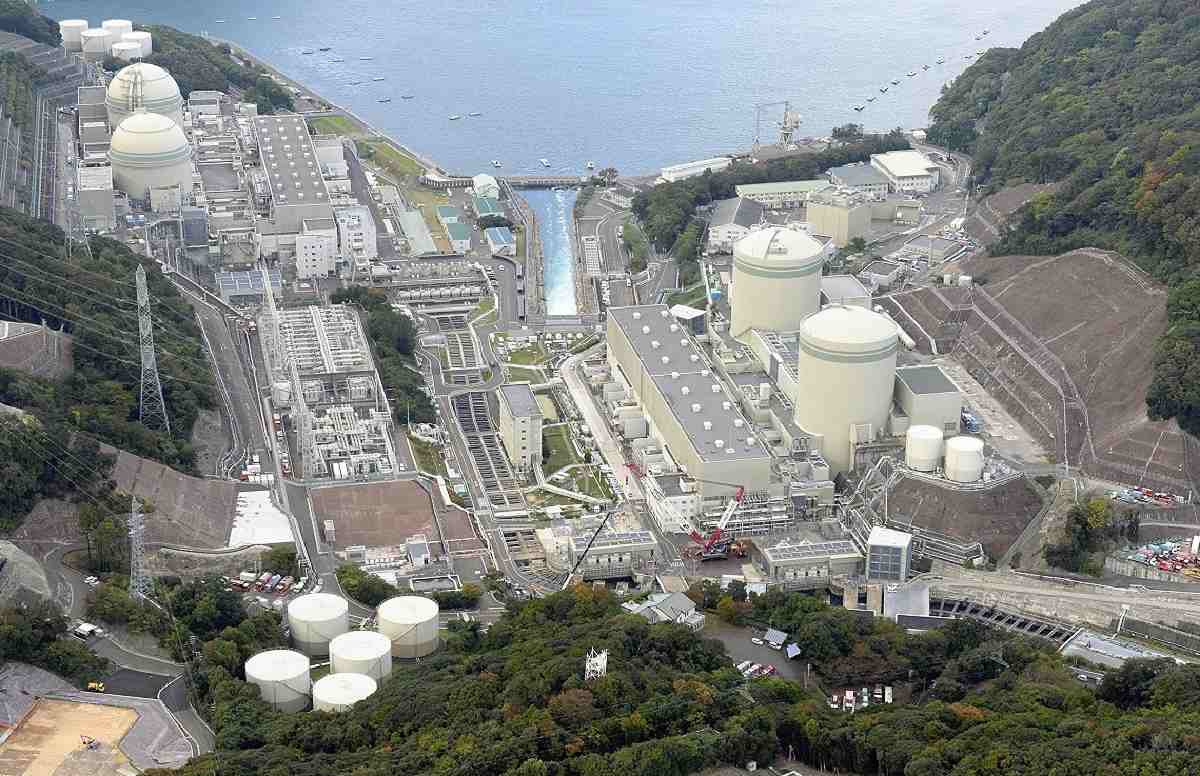Reactor at Takahama Nuclear Power Plant 1st in Japan to Mark 50 Years Since it Began Operating; Oldest at Nuclear Plant Still Operating in Japan

The Takahama nuclear power plant in Fukui Prefecture
15:46 JST, November 14, 2024
The No. 1 reactor at the Takahama nuclear power plant in Fukui Prefecture on Thursday marked 50 years since it began operating, making it the nation’s first reactor to reach this milestone.
Nuclear power is an energy source that contributes to decarbonization efforts and provides a stable supply of electricity at a time when demand for power is expected to surge due to the growing use of artificial intelligence. However, the deterioration of nuclear power facilities that have operated for several decades will become an issue that needs to be addressed.
The Takahama plant’s No. 1 reactor is the oldest at a nuclear plant still operating in Japan. Operated by Kansai Electric Power Co., the reactor was activated on Nov. 14, 1974. The reactor cleared Nuclear Regulation Authority safety standards in April 2016 and, after gaining the consent of local government authorities, was restarted in July 2023 for the first time in 12½ years.
Following the 2011 accident at Tokyo Electric Power Company Holdings, Inc.’s Fukushima No. 1 nuclear power plant, the lifespan of domestic nuclear reactors was in principle set at 40 years, but can be extended up to a maximum of 60 years. In October, the nuclear authority approved Kansai Electric’s 10-year management and maintenance plan for the Takahama No. 1 reactor, which opened the door for the unit to operate beyond its 50th anniversary. Under the Green Transformation law that comes into effect next June, nuclear reactors in Japan could even be allowed to operate for more than 60 years.
Reactors that have been operating for almost 50 years include the No. 2 reactor at the Takahama nuclear plant; the No. 3 reactor at Kansai Electric’s Mihama nuclear plant in Fukui Prefecture; Japan Atomic Power Co.’s Tokai No. 2 nuclear power plant in Ibaraki Prefecture; and the No. 1 unit at Kyushu Electric Power Co.’s Sendai nuclear power plant in Kagoshima Prefecture.
Nuclear plants do not emit greenhouse gases and can stably generate electricity 24 hours a day. The long-term operation of these plants is becoming more commonplace around the world, and some reactors in the United States have been cleared to operate for up to 80 years.
However, the extended operation of these reactors has raised concerns about their degradation over time. If reactors continue to operate without being properly maintained, the risk of cracks, corrosion and other damage increases.
One example of such degradation is embrittlement caused by neutron irradiation. The reactor’s pressure vessel that stores nuclear fuel is constructed from steel, but prolonged exposure to neutrons emitted by the fuel can weaken it. When nuclear reactors in Japan are activated, a fatigue test piece made from the same material as the pressure vessel is mounted inside the vessel. Power companies remove this test piece at intervals of about 10 years to assess the degree of deterioration inside the vessel.
“It’s certainly possible for nuclear power plants to operate for more than 50 years, provided that general inspections are thoroughly conducted and any damaged equipment is repaired or replaced,” said Institute of Science Tokyo Specially Appointed Prof. Tadashi Narabayashi, an expert in reactor engineering and measures to prevent nuclear plant deterioration.
Top Articles in Society
-

Producer Behind Pop Group XG Arrested for Cocaine Possession
-

Man Infected with Measles Reportedly Dined at Restaurant in Tokyo Station
-

Man Infected with Measles May Have Come in Contact with Many People in Tokyo, Went to Store, Restaurant Around When Symptoms Emerged
-

Woman with Measles Visited Hospital in Tokyo Multiple Times Before Being Diagnosed with Disease
-

Australian Woman Dies After Mishap on Ski Lift in Nagano Prefecture
JN ACCESS RANKING
-

Producer Behind Pop Group XG Arrested for Cocaine Possession
-

Japan PM Takaichi’s Cabinet Resigns en Masse
-

Man Infected with Measles Reportedly Dined at Restaurant in Tokyo Station
-

Israeli Ambassador to Japan Speaks about Japan’s Role in the Reconstruction of Gaza
-

Videos Plagiarized, Reposted with False Subtitles Claiming ‘Ryukyu Belongs to China’; Anti-China False Information Also Posted in Japan























